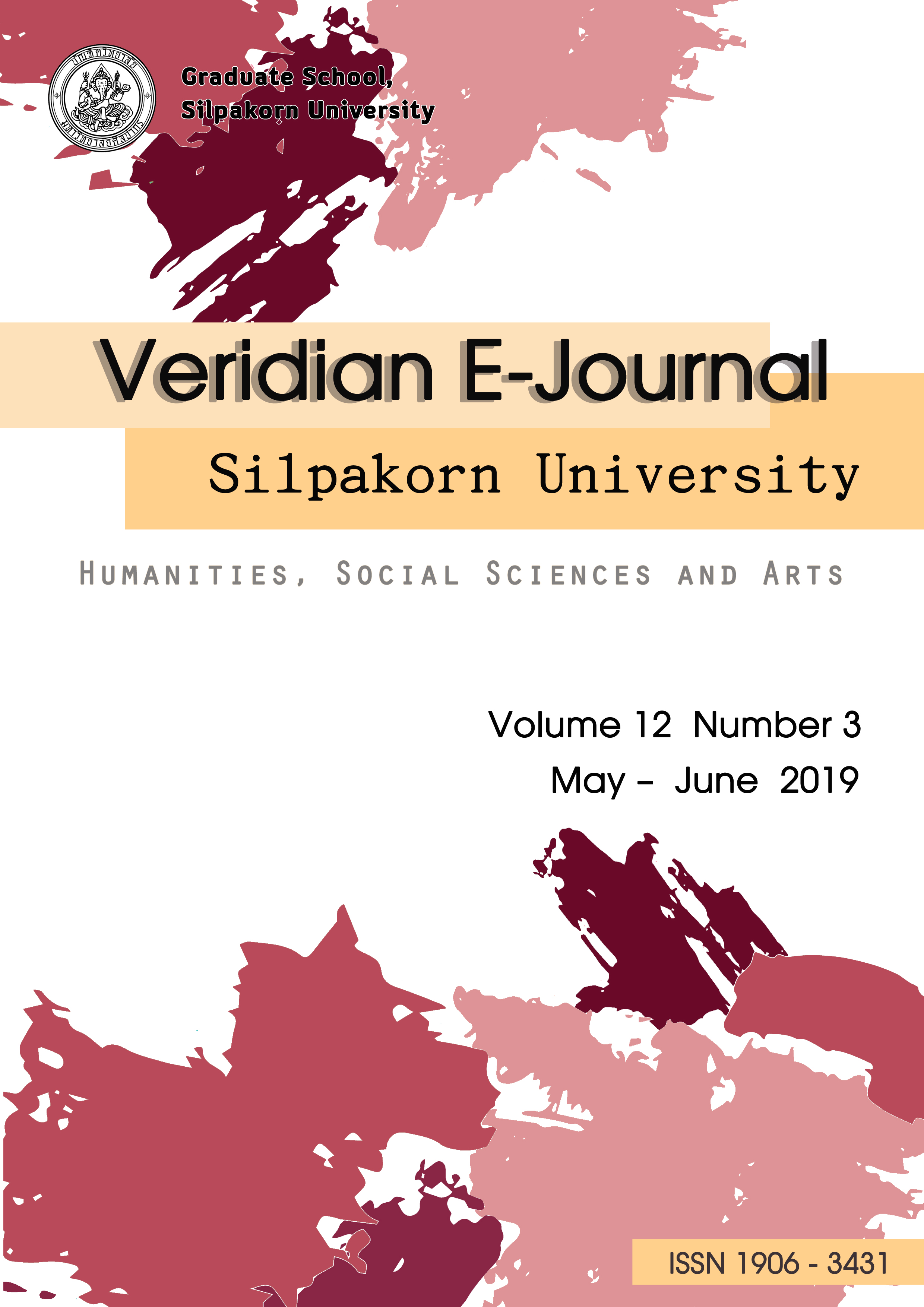Effects of Living Behaviors Following Philosophy of Sufficiency Economy on Purchasing Decisions Made By Studying Personal Factors as a Moderator Variable.
Main Article Content
บทคัดย่อ
Living on the philosophy of sufficiency economy is a modest way of living according to their status and self-reliance. There are many researches to study the application of sufficiency economy philosophy to the organization in order to increase the efficiency of sustainable operations. This research aimed to apply the philosophy of sufficiency economy to study the lifestyle of people to make a purchase. The sample size was 513 respondents obtained by stratified random sampling. Data were analyzed by hierarchical regression analysis. The living standard of sufficiency economy was at the medium level. The elderly are more modest by buying more needed products than those who are in a working age. In addition, those with lower monthly income will have more income to plan their spending than those who are older. The government should find ways to raise awareness for the people to adopt the philosophy of sufficiency economy for more applications. This is a foundation for sustainable economic development.
Article Details
เอกสารอ้างอิง
Boonyanuwat, R. (2011). Application of philosophy of sufficiency economy to conduct the way of life of people’s in community Dusit district, Bangkok Metropolitan. Research Report, Suansunandha Rajabhat University.
The Chaipattana Foundation. (2016). Setthakit phophiang [What is sufficient economy?] Retrieved on September 17, 2018 from https://www.chaipat.or.th/site_content/item/1309-2010-06-03-09-50-07.html
Carrigan M., Szmigin I., & Wright F. (2004). Shopping for a better world? An interpretive study of the potential for ethical consumption within the older market. Journal of Consumer Marketing, 21(6), 401–417.
Chaoprasert C. (2004). Kāntalāt bǭrikān [Service Marketing]. Bangkok: SE-EDucation Public Company Limited.
Department of Community Development, Ministry of Interior. (2006). khūmư̄ patibatkān sētthakit phō̜phīang nai chumchon phư̄a yok radap rāidai khrūarư̄an [Sufficiency economy practices guide in communities to raise household income]. Bangkok: Community Enterprise Promotion Division.
Donkwa, K. (2011). Behaviors and Factors Affecting Decisions Concerning Purchase of Products and Services for the Elderly People in A Sufficiency Economy. Journal of Public and Private Management, 18(2), 77–110.
Ebel, R. L. & Frisbie, D. A. (1986). Essentials of Educational Measurement (4th ed.). Englewood Cliffs. New Jersey: Prentice-Hall.
Fiscal Policy Office. (2008). Nǣonōm kān bō̜riphōk khō̜ng Khon Thai plīan pai [The changing of Thailand's consumption]. Retrieved September 25, 2018, from https://mgronline.com/stockmarket/detail/9500000073306
Kantamaturapoj, K. (2018). Future Vision of Thai Consumers on Sustainable Food Purchasing. Veridian E-Journal, Silpakorn University, 11(4), 438–452.
Kline, R. B. (2015). Principles and practice of Structural Equation Modeling (4th ed.). New York: Guilford publications.
Kotler P., & Armstrong G. (2006). Principles of Marketing (11th ed.). New Jersey: Prentice-Hall.
Office of the National Economic and Social Development Board. (2016). Sarup phonkān prachum radom khwāmhen rāng phǣn phatthanā chabap thī sipsō̜ng radap phāk. [Summary of the Draft National Development Plan No.12]. The Economic and Social Journal, 53(2), 47–48.
Pitukmuangman, C. (2010). Attitude of the students toward the application of sufficiency economy to the dairy life: A case study of Faculty of Business Administration Rajamagala University of Technology Phra Nakhon. Research report, Rajamagala University of Technology Phra Nakhon.
Rovinelli, R. J., & Hambleton, R. K. (1977). On the use of content specialists in the assessment of criterion-referenced test item validity. Dutch journal of Educational Research, 2: 49–60.
Russell, L. H., Bruce, E. A., & Conahan, J. (2006). A methodology to determine economic security for elders. Gerontology Institute, University of Massachusetts Boston, and Wider Opportunities for Women, Washington, DC.
Santiwong, T. (2007). Phrưttikam phūbō̜riphōk thāngkān talāt [Consumer Behavior in marketing]. Bangkok: PCC Publishing.
The Stock Exchange of Thailand. (2017). Khrōngsāng kānčhat klum ʻutsāhakam læ mūat thurakit khō̜ng talāt laksap [Industry division by the stock exchange of Thailand] Retrieved July 5, 2018, from https://www.set.or.th/th/regulations/simplified_regulations/industry_sector_p1.html
Tongmak, S. (2016). Sukkhaphāp wai phūyai læ phū sūngʻāyu [Adult and later maturity health] Retrieved July 5, 2018, from
https://www.healthcarethai.com/%E0%B8%9C%E0%B8%B9%E0%B9%89%E0%B9%83%E0%B8%AB%E0%B8%8D%E0%B9%88%E0%B9%81%E0%B8%A5%E0%B8%B0%E0%B8%9C%E0%B8%B9%E0%B9%89%E0%B8%AA%E0%B8%B9%E0%B8%87%E0%B8%AD%E0%B8%B2%E0%B8%A2%E0%B8%B8/
Unaromlert, T. and Janpla, J (2014). The development of product model based on the creative economy to construct value-added of community enterprise in Nakhon Pathom province. Veridian E-Journal, Silpakorn University, 7(5), 161–177.
Upaipanich, J. (2010). Khwāmkhithen khō̜ng khārātchakān rư̄ančham čhangwat nonthaburī tō̜ kānnam pratyā sētthakit phō̜phīang māsū kān patibat [The attitude of prison officials in Nonthaburi province to implement the philosophy of sufficiency economy]. Master of art dissertation, National Institute of Development Administration.
Wanasilp, W. (2015). The relationship between the understanding of philosophy of sufficiency economy and the living standard: the case study of sufficiency economy community in lower northern region of Thailand. International Journal of Business and Economic Development (IJBED), 3(1), 87-95.
Yodpruttikarn, P. (2007). Khrōngkān čhattham thānkhō̜mūn thī kīao khō̜ng kap pratyā sētthakit phō̜phīang [Philosophy of sufficiency economy for database development] Retrieved Ausgust 21, 2018, from https://www.sedb.org/conclude3.html

